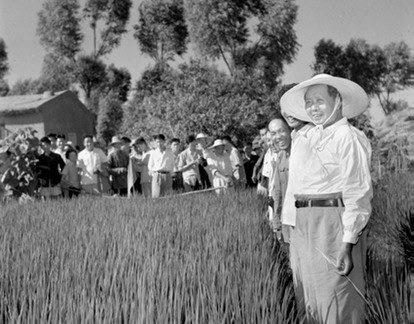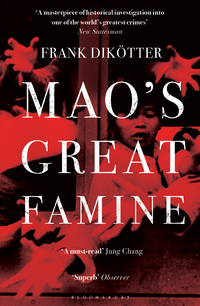The Scotland on Sunday, 29 August 2010
Hysteria and hunger when China's Great Helmsman lost his way
GAVIN BOWD
THERE was a time when China wanted to economically overtake Britain. In 1957, Mao Zedong launched his "Great Leap Forward": the People's Republic would eclipse not only the UK but wrest from the Soviet Union leadership of the Communist camp.
But, in the next four years, the "sputnik fields" would turn into killing fields. In this brave and brilliant book, Frank Dikotter, a professor at the University of Hong Kong, provides an account of China's most devastating catastrophe, drawing on provincial archives and interviews with survivors of the famine.
The "Great Helmsman" launched a programme of crash collectivisation and industrialisation which swelled the cities and dislocated the countryside. The dispossessed peasantry were forced to provide huge increases of grain, which was then exported to buy foreign machinery. During this time, British manufacturers licked their lips, and rice became a staple food in East Germany.
As the great hunger took hold, so did madness: in Sichuan, hundreds of villagers went berserk, talking gibberish and bursting into convulsive laughter; Mao exhorted the people to "open fire on nature", and crowds killed sparrows through exhaustion by beating gongs to prevent them from landing, until insects were free to ravage the land. But such a wave of hysteria showed the complicity of millions: everyone traded to survive in this communist utopia; cadres feasted for free at interminable conferences, while little Maos of the provinces built their fiefdoms. The most vulnerable paid: children were abandoned, sold or even eaten; rape spread like a contagion; while an elderly man was told: "If we feed the pigs at least we will get some meat!"
The starving people were too weak to resist their Party. The outside world turned a blind eye too. If Dikotter shows that the Soviet Union did not force China to export more food, we see that the crown colony of Hong Kong refused to accept refugees who would have been greeted with open arms in West Berlin.
In 1961, after another feast with Mao, future French president Francois Mitterrand described his host as "a great scholar known in the entire world for the diversity of his genius". By 1962, there were upwards of 50 million "excess deaths" from a population of 650 million, proportionally still short of those in the Irish Famine. Indeed, it was hard to emulate Britain.

